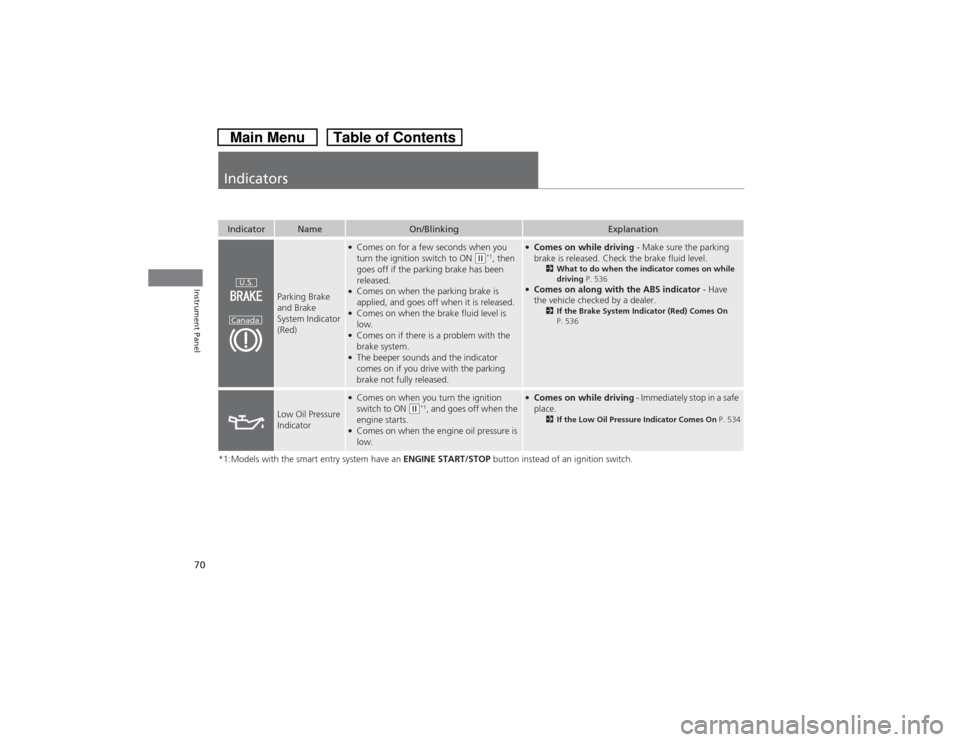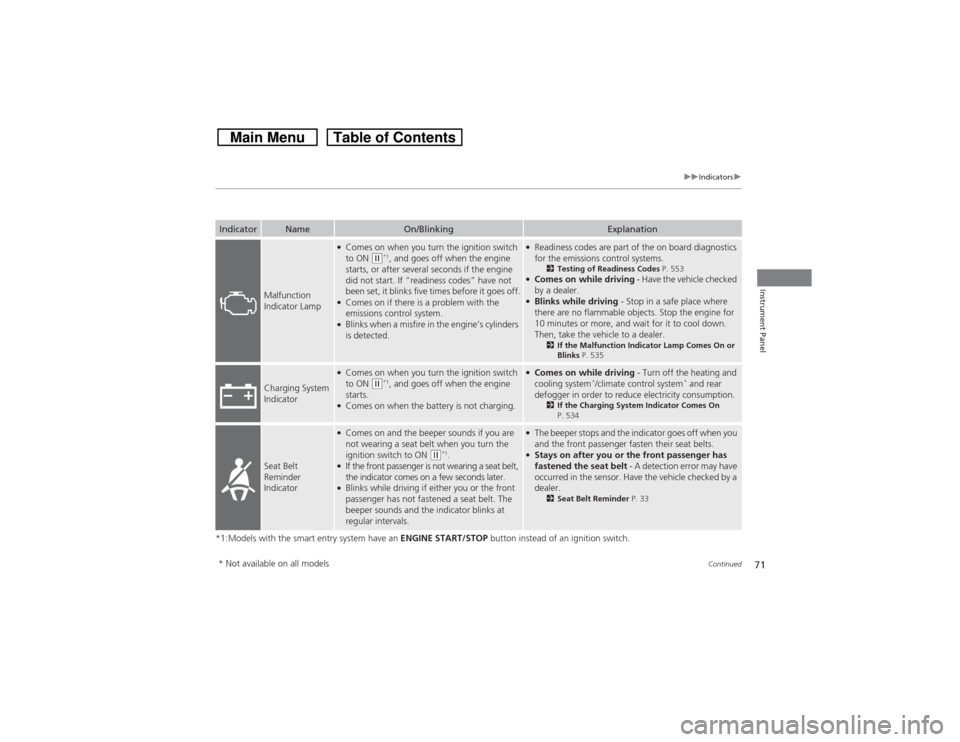2014 HONDA CROSSTOUR instrument panel
[x] Cancel search: instrument panelPage 1 of 573

ContentsThis owner’s manual should be considered a permanent part of the
vehicle and should remain with the vehicle when it is sold.
This owner’s manual covers all models of your vehicle. You may find
descriptions of equipment and features that are not on your
particular model.
Images throughout this owner’s manual (including the front cover)
represent features and equipment that are available on some, but
not all, models. Your particular model may not have some of these
features.
This owner’s manual is for vehicles sold in the United States and
Canada.
The information and specifications included in this publication were
in effect at the time of approval for printing. Honda Motor Co., Ltd.
reserves the right, however, to discontinue or change specifications
or design at any time without notice and without incurring any
obligation.
2Safe Driving P. 27For Safe Driving P. 28 Seat Belts P. 32 Airbags P. 392Instrument Panel P. 69Indicators P. 70 Gauges and Displays P. 832Controls P. 87Setting the Clock P. 88 Locking and Unlocking the Doors P. 91
Opening and Closing the Moonroof P. 113
Adjusting the Seats P. 133
Climate Control System
* P. 157
2Features P. 163Audio System P. 164 Audio System Basic Operation P. 169, 182, 215
Customized Features
* P. 281 HomeLink® Universal Transceiver
* P. 318
2Driving P. 409Before Driving P. 410 Towing a Trailer P. 415Parking Your Vehicle P. 453
Rearview Camera P. 454
Multi-View Rear Camera P. 455
2Maintenance P. 461Before Performing Maintenance P. 462 Maintenance Minder
TM P. 465
Checking and Maintaining Wiper Blades P. 493
Heating and Cooling System
*/Climate Control System
* Maintenance P. 509
2Handling the Unexpected P. 515Tools P. 516 If a Tire Goes Flat P. 517
Overheating P. 532 Indicator, Coming On/Blinking P. 534
When You Cannot Unlock the Fuel Fill Door P. 5432Information P. 545Specifications P. 546 Identification Numbers P. 550
Emissions Testing P. 553 Warranty Coverages P. 555
Page 2 of 573

Contents
Child Safety P. 54 Exhaust Gas Hazard P. 66 Safety Labels P. 67Opening and Closing the Tailgate P. 105 Security System P. 107 Opening and Closing the Windows P. 110
Operating the Switches Around the Steering Wheel P. 114 Adjusting the Mirrors P. 130
Interior Lights/Interior Convenience Items P. 142 Heating and Cooling System
* P. 154
Audio Error Messages P. 268 General Information on the Audio System P. 276
Bluetooth® HandsFreeLink® P. 320, 332, 367 Compass
* P. 405, 407
When Driving P. 420 Braking P. 449
Refueling P. 456 Fuel Economy P. 459 Accessories and Modifications P. 460Maintenance Under the Hood P. 469 Replacing Light Bulbs P. 484
Checking and Maintaining Tires P. 497 Battery P. 506 Remote Transmitter Care P. 507
Cleaning P. 510Engine Does Not Start P. 525 Jump Starting P. 528 Shift Lever Does Not Move P. 531
Fuses P. 538 Emergency Towing P. 542
When You Cannot Open the Tailgate P. 544Devices that Emit Radio Waves P. 551 Reporting Safety Defects P. 552
Authorized Manuals P. 557 Customer Service Information P. 558
Quick Reference Guide
P. 2
Safe Driving
P. 27
Instrument Panel
P. 69
Controls
P. 87
Features
P. 163
Driving
P. 409
Maintenance
P. 461
Handling the Unexpected
P. 515
Information
P. 545
Index
P. 562
Page 9 of 573

8Quick Reference Guide
Instrument Panel
(P 69)
System Indicators
Malfunction
Indicator Lamp
Low Oil Pressure
Indicator
Charging System
Indicator
Anti-lock Brake
System (ABS)
Indicator
Vehicle Stability
Assist (VSA®) System
Indicator
VSA® OFF Indicator
Low Tire Pressure
Indicator
Lights Indicators
Lights On Indicator
High Beam Indicator
Fog Light Indicator Immobilizer System
IndicatorSeat Belt Reminder
Indicator
System Indicators
CRUISE CONTROL
Indicator Parking Brake and
Brake System
Indicator (Red)Supplemental
Restraint System
Indicator
Side Airbag Off
Indicator
CRUISE MAIN
Indicator Tachometer Speedometer
Fuel Gauge Security System Alarm
IndicatorShift Lever Position Indicator
Low Fuel Indicator
Gauges
(P 83)
/Information Display
(P 84)
/System Indicators
(P 70)
Fuel Economy
Indicator
*
TPMS Indicator
Maintenance Minder
Indicator
Washer Level
Indicator
*
Temperature Gauge
Electric Power
Steering (EPS) System
Indicator
*
Turn Signal and
Hazard Warning
Indicators
System Indicators
CanadaU.S.
CanadaU.S.
Starter System
Indicator
*
Door and Tailgate
Open Indicator
Smart Entry System
Indicator
*
CanadaU.S.
Forward Collision
Warning (FCW) Indicator
*
Lane Departure Warning
(LDW) Indicator
*
M (Sequential shift mode) Indicator/
Shift Indicator
*
Daytime Running
Lights Indicator
Page 19 of 573

18Quick Reference Guide
Driving
(P409)
Release ButtonShift LeverAutomatic Transmission
(P426, 428)
●Shift to
(P and depress the brake pedal when starting the engine.
Shifting
Park
Turn off or start the engine.
Transmission is locked.
Reverse
Used when reversing.
Neutral
Transmission is not locked.
Drive
Normal driving.
On models with paddle shifter,
D-paddle shift mode can be used.Drive (D3)
Used when:
•Going up or down hills
•Towing a trailer in hilly terrain
Second
Used to increase engine braking (the
transmission is locked in 2nd gear)
First
Used to further increase engine braking
(the transmission is locked in 1st gear)
Models with
paddle shifter
Models without
paddle shifter
S Position
Sequential shift mode can be used.
Models with paddle shifter
Models without paddle shifter
Paddle Shifters
(P431)
●Paddle shifters allow you to shift gears much like a
manual transmission (1st through 6th). This is useful for
engine braking.
●D-paddle shift mode: The transmission will shift back to
automatic mode once the system detects that the vehicle
is cruising.
●Sequential shift mode: Holds the selected gear, and the M
indicator comes on.
●The selected gear position is shown in the instrument
panel.
Shift Down
(-
Paddle ShifterShift Up
(+
Paddle Shifter
Selected Gear
Number M Indicator Shift Lever
Position Indicator Depress the brake pedal and
press the release button to
move out of
(P.
Move the shift lever without
pressing the release button.
Press the release button to move
the shift lever.
Page 41 of 573

40
uuAirbagsuAirbag System Components
Safe Driving
The front, front side, and side curtain
airbags are deployed according to the
direction and severity of impact. Both side
curtain airbags are deployed in a rollover.
The airbag system includes:aTwo SRS (Supplemental Restraint System)
front airbags. The driver’s airbag is stored
in the center of the steering wheel; the
front passenger’s airbag is stored in the
dashboard. Both are marked SRS
AIRBAG.bTwo side airbags, one for the driver and
one for a front passenger. The airbags are
stored in the outer edges of the seat-
backs. Both are marked SIDE AIRBAG.cTwo side curtain airbags, one for each
side of the vehicle. The airbags are stored
in the ceiling, above the side windows.
The front and rear pillars are marked
SIDE CURTAIN AIRBAG.
dAn electronic control unit that continually
monitors and records information about
the sensors, the airbag activators, the
seat belt tensioners, and driver and front
passenger seat belt use when the ignition
switch is in ON
(w*1.
eAutomatic front seat belt tensioners. The
driver’s and front passenger’s seat belts
incorporate sensors that detect whether
or not they are fastened.fA driver’s seat position sensor. If the seat
is too far forward, the airbag will inflate
with less force.gWeight sensors in the front passenger’s
seat. The front passenger’s airbag will be
turned off if the weight on the seat is 65
lbs (29 kg) or less (the weight of an infant
or small child).
hImpact sensors that can detect a
moderate-to-severe front or side impact.iAn indicator on the dashboard that alerts
you that the front passenger’s front
airbag has been turned off.jSensors that can detect if a child or small
statured adult is in the deployment path
of the front passenger’s side airbag.kAn indicator on the instrument panel that
alerts you to a possible problem with your
airbag system or seat belt tensioners.lAn indicator on the instrument panel that
alerts you that the front passenger’s side
airbag has been turned off.mSafing SensornA rollover sensor that detects whether
the vehicle is about to roll over.*1: Models with the smart entry system have an
ENGINE START/STOP button instead of an
ignition switch.
Page 70 of 573

69
Instrument Panel
This chapter describes the buttons, indicators, and gauges that are used while driving.
Indicators............................................ 70
Information Display Warning and
Information Messages ...................... 82
Gauges and Displays
Gauges .............................................. 83
Information Display............................ 84
Page 71 of 573

70Instrument Panel
Indicators*1:Models with the smart entry system have an ENGINE START/STOP button instead of an ignition switch.Indicator
Name
On/Blinking
Explanation
Parking Brake
and Brake
System Indicator
(Red)
●Comes on for a few seconds when you
turn the ignition switch to ON
(w*1, then
goes off if the parking brake has been
released.
●Comes on when the parking brake is
applied, and goes off when it is released.●Comes on when the brake fluid level is
low.●Comes on if there is a problem with the
brake system.●The beeper sounds and the indicator
comes on if you drive with the parking
brake not fully released.
●Comes on while driving - Make sure the parking
brake is released. Check the brake fluid level.
2What to do when the indicator comes on while
driving P. 536
●Comes on along with the ABS indicator - Have
the vehicle checked by a dealer.
2If the Brake System Indicator (Red) Comes On
P. 536
Low Oil Pressure
Indicator
●Comes on when you turn the ignition
switch to ON
(w*1, and goes off when the
engine starts.
●Comes on when the engine oil pressure is
low.
●Comes on while driving - Immediately stop in a safe
place.
2If the Low Oil Pressure Indicator Comes On P. 534
U.S.
Canada
Page 72 of 573

71
uuIndicatorsu
Continued
Instrument Panel
*1:Models with the smart entry system have an ENGINE START/STOP button instead of an ignition switch.Indicator
Name
On/Blinking
Explanation
Malfunction
Indicator Lamp
●Comes on when you turn the ignition switch
to ON
(w*1, and goes off when the engine
starts, or after several seconds if the engine
did not start. If “readiness codes” have not
been set, it blinks five times before it goes off.
●Comes on if there is a problem with the
emissions control system.●Blinks when a misfire in the engine’s cylinders
is detected.
●Readiness codes are part of the on board diagnostics
for the emissions control systems.
2Testing of Readiness Codes P. 553
●Comes on while driving - Have the vehicle checked
by a dealer.●Blinks while driving - Stop in a safe place where
there are no flammable objects. Stop the engine for
10 minutes or more, and wait for it to cool down.
Then, take the vehicle to a dealer.
2If the Malfunction Indicator Lamp Comes On or
Blinks P. 535
Charging System
Indicator
●Comes on when you turn the ignition switch
to ON
(w*1, and goes off when the engine
starts.
●Comes on when the battery is not charging.
●Comes on while driving - Turn off the heating and
cooling system
*/climate control system
* and rear
defogger in order to reduce electricity consumption.
2If the Charging System Indicator Comes On
P. 534
Seat Belt
Reminder
Indicator
●Comes on and the beeper sounds if you are
not wearing a seat belt when you turn the
ignition switch to ON
(w*1.
●If the front passenger is not wearing a seat belt,
the indicator comes on a few seconds later.●Blinks while driving if either you or the front
passenger has not fastened a seat belt. The
beeper sounds and the indicator blinks at
regular intervals.
●The beeper stops and the indicator goes off when you
and the front passenger fasten their seat belts.●Stays on after you or the front passenger has
fastened the seat belt - A detection error may have
occurred in the sensor. Have the vehicle checked by a
dealer.
2Seat Belt Reminder P. 33
* Not available on all models